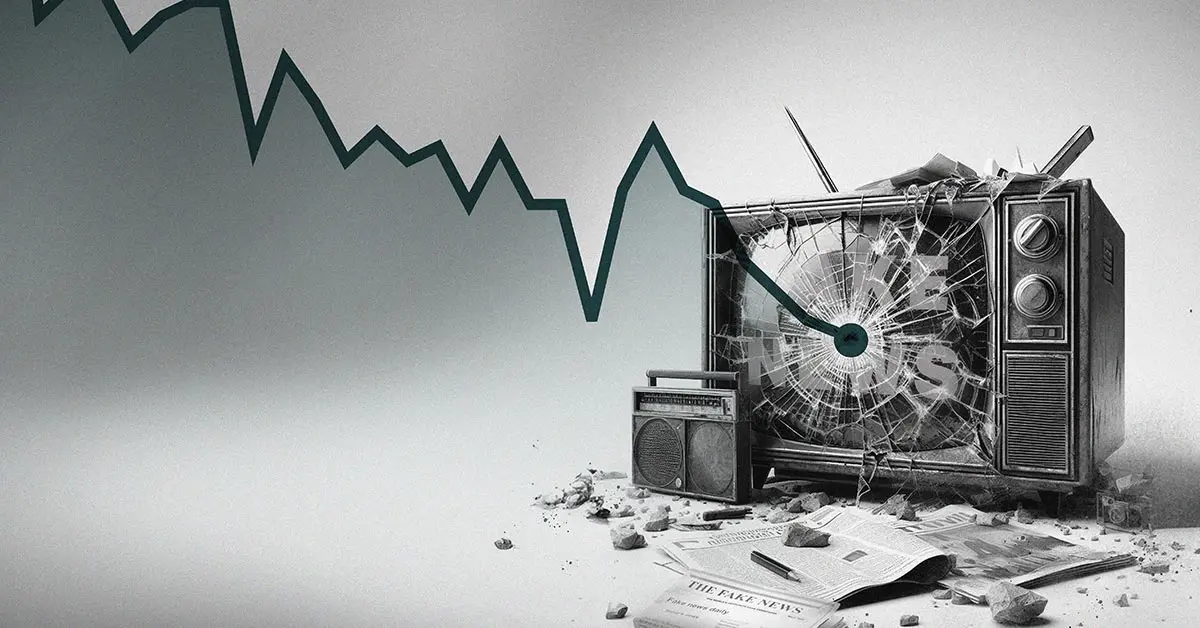Introduction
A growing wave of Americans are turning their backs on traditional media outlets, citing widespread bias, misinformation, and political manipulation. Across social media, phrases like “Raise your hand if you’ve completely stopped believing the mainstream media” are trending, signaling a fundamental shift in public trust.
The Fall of Legacy News Networks
Once considered pillars of public information, networks like CNN, MSNBC, ABC, NBC, CBS, and even Fox News are now viewed with skepticism by millions. Surveys consistently show that public confidence in legacy media has been eroding steadily over the past decade.
According to a Gallup poll, only 32% of Americans say they trust the mass media “a great deal” or “a fair amount.” Among Republicans, that number drops to just 14%.
Generational and Political Shifts in Media Trust
Distrust in media isn’t just partisan—it’s generational. Millennials and Gen Z audiences increasingly reject mainstream TV news, opting instead for YouTube, podcasts, and independent commentators. The rise of creators like Joe Rogan, Tim Pool, Russell Brand, and Candace Owens illustrates a hunger for narratives outside traditional editorial control.
Why Americans Are Turning Away
Many Americans cite media manipulation during the COVID-19 pandemic, biased coverage of the 2020 election, and selective foreign policy narratives as core reasons for their disillusionment. Others point to corporate ownership and advertising influence as major factors tainting journalistic independence.
“They don’t report facts anymore—they manufacture consent,” said one viral TikTok video with over 3 million views.
The Rise of Alternative Media
The term “mockingbird media” is gaining traction online, referencing alleged government-media collusion. Meanwhile, citizen journalism is booming. Smartphone footage, Twitter Spaces, and Substack newsletters are filling the gap left by distrusted networks.
Many believe this decentralization is restoring journalistic accountability. However, critics warn it opens the door to misinformation and unverified claims.
Legacy Media Fights Back
Major media organizations continue to defend their reporting, claiming they are victims of politically motivated attacks. Fact-checking outlets, often partnered with traditional newsrooms, push back against viral posts they argue distort the truth. But for many Americans, the damage is already done.
“They told us Russia hacked the election, that inflation was transitory, and that the border is secure,” said one user in a trending Reddit thread. “None of that matches reality.”
Biased Coverage and Public Outrage
Even breaking news is now met with skepticism. Critics argue the media cherry-picks stories that align with political narratives while burying uncomfortable facts—particularly in crime reporting, immigration, and public health.
Conservatives feel vilified, claiming the media treats right-wing views as dangerous disinformation. Progressives argue the same outlets enable corporate interests and military agendas. This mutual distrust reveals a larger issue: mainstream media is losing control of the national conversation.
Explosive Growth of Independent Platforms
As a result, alternative media platforms are growing rapidly. Podcasts like Breaking Points and The Daily Wire have seen massive spikes in audience numbers. YouTubers like Matt Walsh and Russell Brand are drawing millions of views per episode. Independent journalists like Glenn Greenwald, Bari Weiss, and Michael Shellenberger have built loyal followings through platforms like Substack.
A Global Phenomenon
This isn’t just happening in the U.S. Globally, trust in mainstream media is also plummeting:
-
In the UK, BBC trust ratings are at historic lows.
-
In Canada, CBC has been labeled “state-funded” on social media, sparking public backlash.
-
Across Europe and Australia, legacy outlets face stiff competition from smaller, more agile media collectives.
Politicians Embrace the Shift
Back in the U.S., several politicians are leaning into this media skepticism. Donald Trump continues to label CNN and others as “fake news.” Florida Governor Ron DeSantis bypasses traditional press with livestreamed announcements. Independent presidential candidate RFK Jr. has made media distrust a central theme of his campaign.
The Double-Edged Sword of Decentralized Media
Whether this media migration signals a new era of transparency or dangerous polarization remains uncertain. Some fear that abandoning all traditional journalism is pushing Americans deeper into ideological echo chambers. Without a shared source of truth, national unity may be impossible.
Yet others argue this shift is long overdue—a natural correction to decades of centralized narrative control.
“I’m not anti-news,” said one voter. “I’m just done letting six corporations tell me what to think.”
Conclusion
As more Americans—symbolically or literally—raise their hands in rejection of legacy media, the future of journalism appears both promising and perilous. One thing is certain: trust, once lost, is hard to regain.
Keywords to Rank With:
trust in mainstream media 2025, alternative news sources USA, why Americans distrust media, Gallup media trust poll, rise of citizen journalism, CNN bias, YouTube news 2025, Substack journalists
